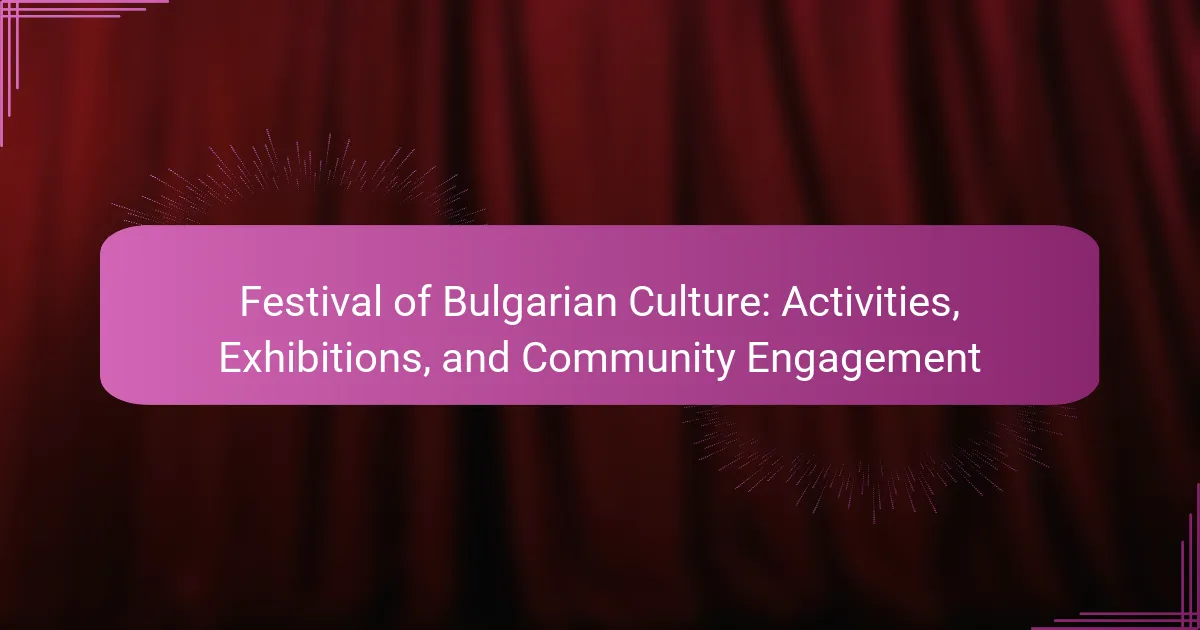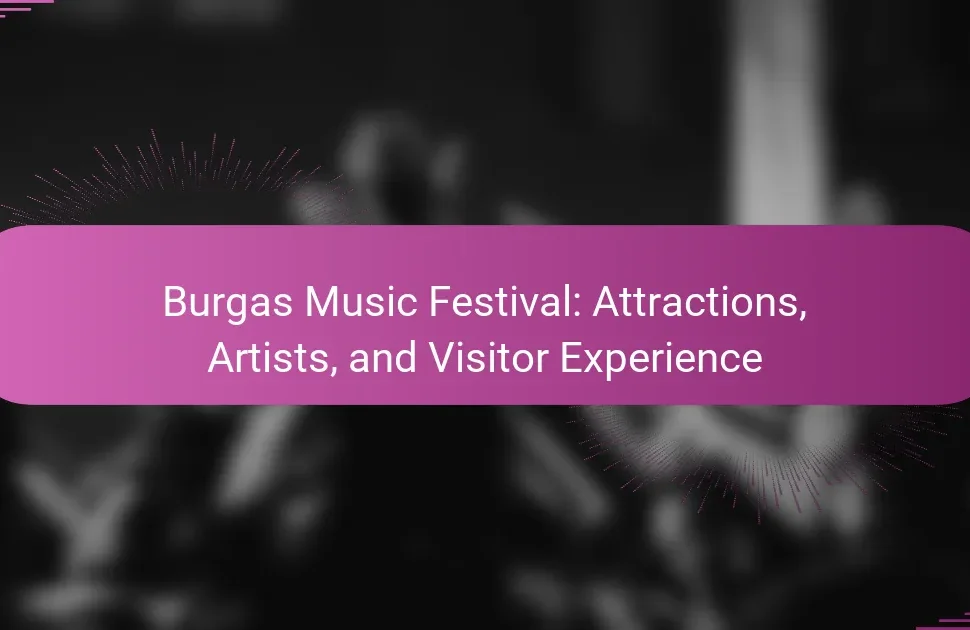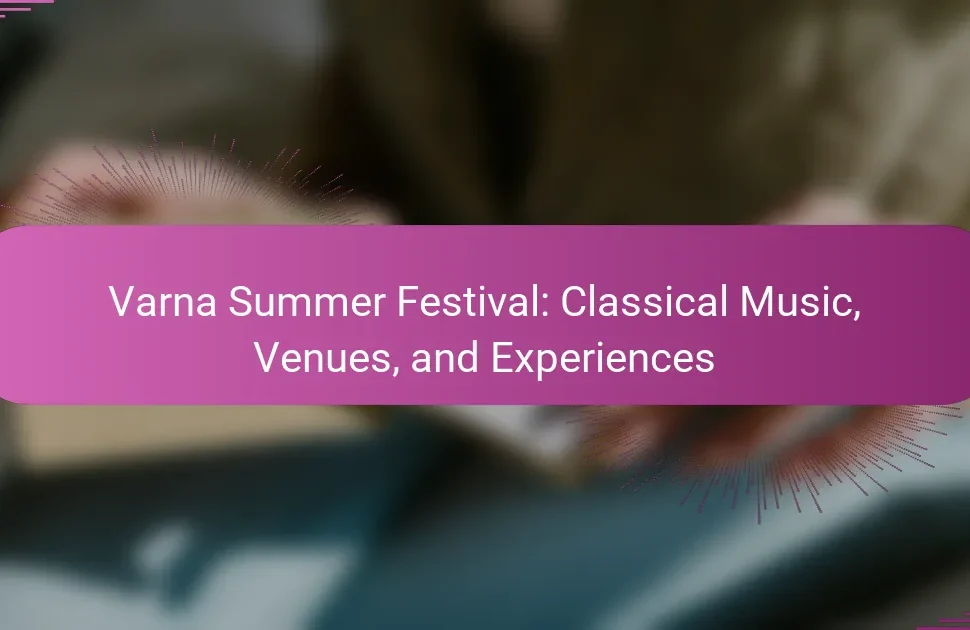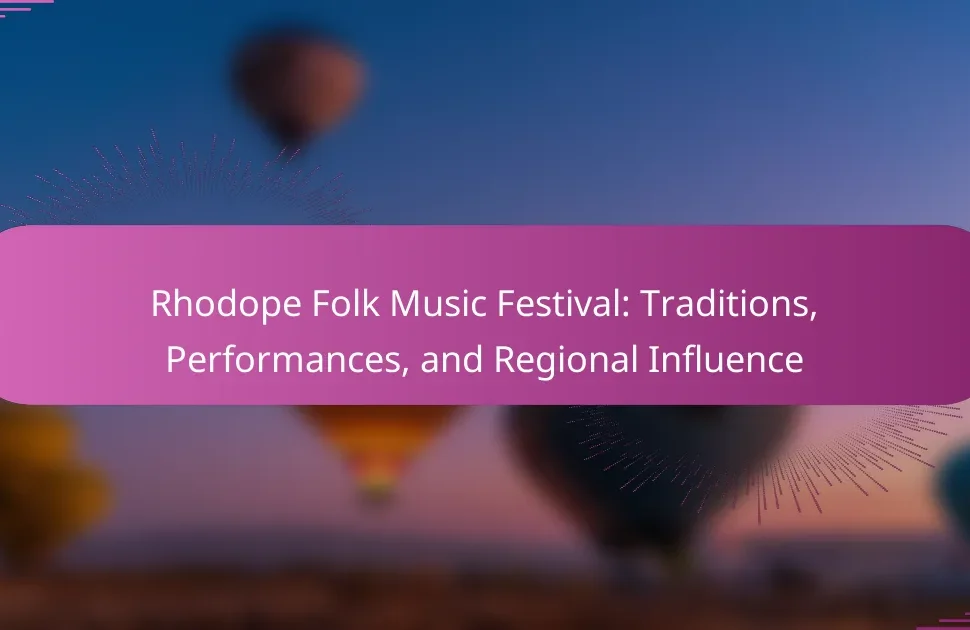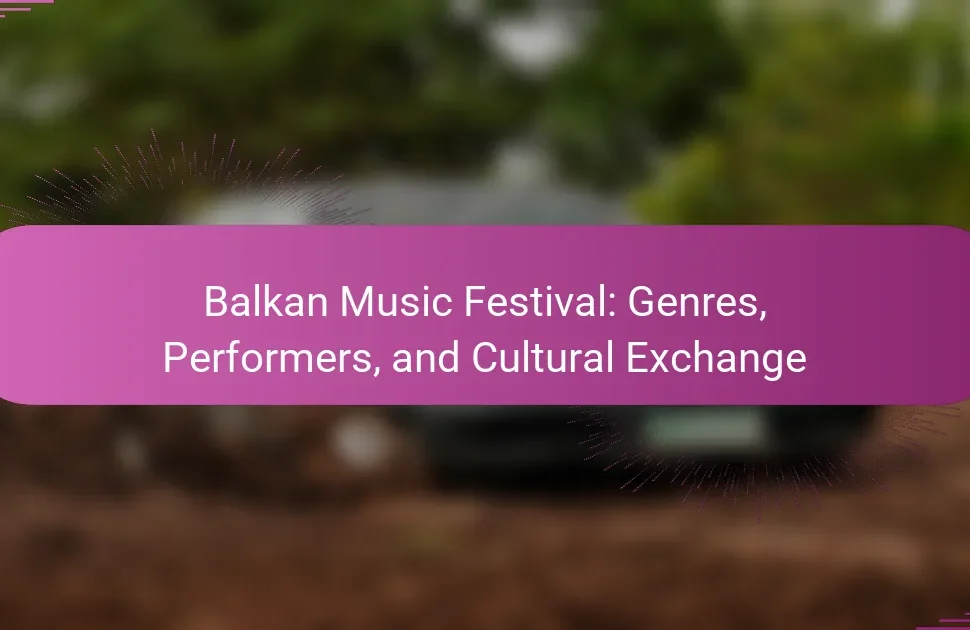The Festival of Bulgarian Culture offers a vibrant celebration of heritage through traditional music, dance performances, and artisan workshops. Attendees can explore cultural exhibitions showcasing handmade crafts and historical displays. The festival promotes community engagement with interactive activities and opportunities for collaboration. Accessibility features ensure inclusivity, making it an enriching experience for all participants.
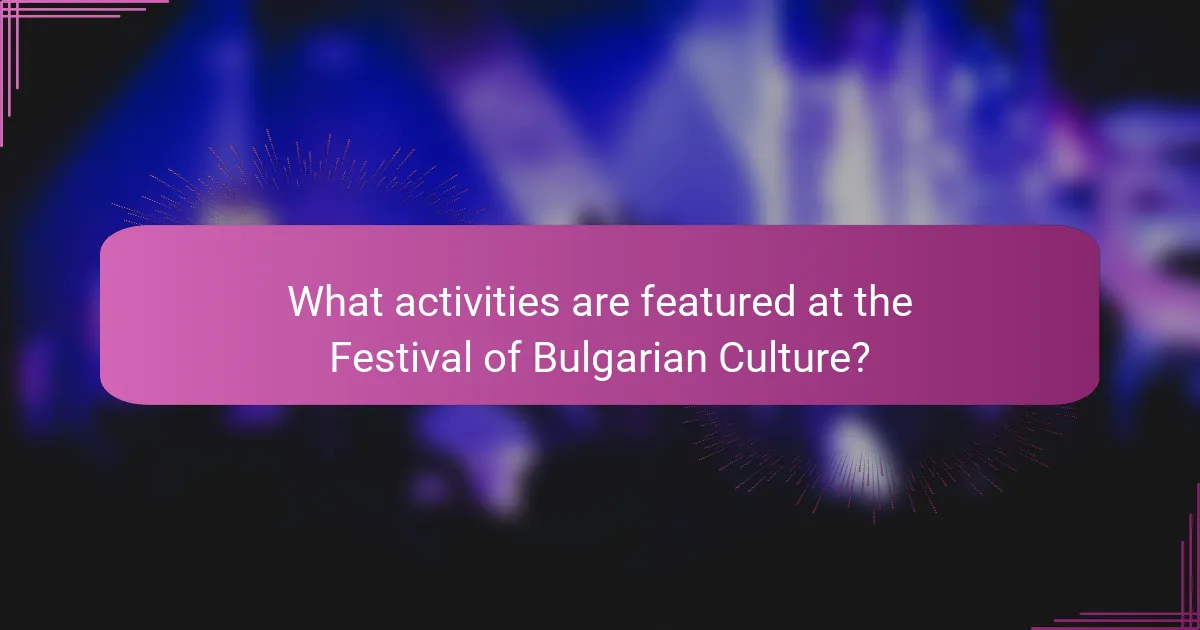
What activities are featured at the Festival of Bulgarian Culture?
The Festival of Bulgarian Culture features traditional music, dance performances, artisan workshops, culinary tastings, and cultural exhibitions. These activities promote community engagement and celebrate Bulgarian heritage. Attendees can enjoy interactive experiences that highlight local customs and traditions.
How do traditional performances enhance cultural appreciation?
Traditional performances significantly enhance cultural appreciation by immersing audiences in authentic experiences. These performances showcase unique attributes of Bulgarian culture, such as folk music, dance, and storytelling, fostering a deeper understanding of cultural heritage. Engaging with these traditions allows community members and visitors to connect emotionally and intellectually, promoting respect and admiration for diverse cultural expressions. Through festivals, interactive activities, and exhibitions, the richness of Bulgarian culture is celebrated, creating a vibrant atmosphere that encourages active participation and cultural exchange.
Which workshops promote Bulgarian arts and crafts?
The Festival of Bulgarian Culture features workshops that promote traditional Bulgarian arts and crafts, including pottery, weaving, and wood carving. These activities engage the community and showcase Bulgaria’s rich cultural heritage. Participants can learn from skilled artisans, fostering appreciation for these unique crafts. The workshops often highlight rare techniques passed down through generations, ensuring the preservation of this cultural legacy.
What role do culinary experiences play in the festival?
Culinary experiences are central to the Festival of Bulgarian Culture, enhancing community engagement and cultural appreciation. Traditional Bulgarian cuisine showcases unique flavors and recipes, inviting attendees to explore the nation’s heritage. Food-related activities, such as cooking demonstrations and tastings, foster interaction among participants and promote cultural exchange. This engagement deepens connections within the community, making culinary experiences a vital aspect of the festival’s success.
How are children’s activities integrated into the festival?
Children’s activities are integrated into the festival through interactive workshops, performances, and art stations. These activities encourage creativity and cultural appreciation among young attendees. For example, children can participate in traditional dance lessons and craft-making sessions that reflect Bulgarian heritage. The festival also features storytelling sessions that engage children with folklore and history. This integration fosters community bonding and ensures that cultural traditions are passed down to future generations.
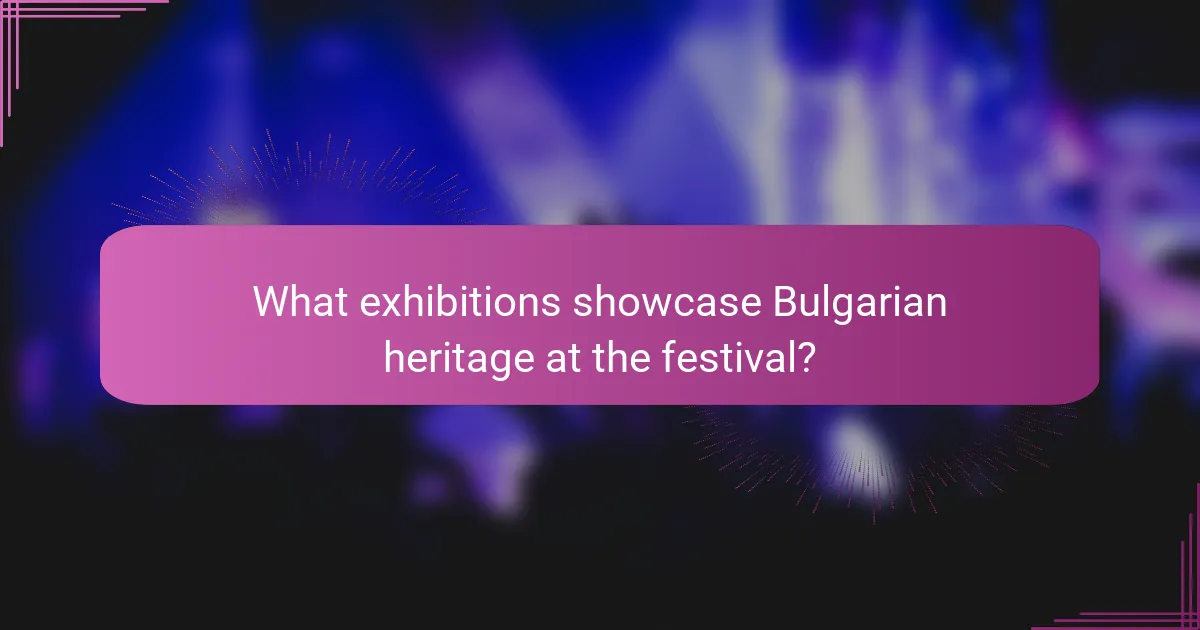
What exhibitions showcase Bulgarian heritage at the festival?
The festival features exhibitions that celebrate Bulgarian heritage through traditional crafts, folklore, and historical displays. Notable exhibitions include the “Bulgarian Folk Art” showcase, which highlights handmade textiles and pottery, and the “History of Bulgaria” exhibit, offering insights into significant cultural milestones. Additionally, interactive workshops allow visitors to experience traditional dance and music, fostering community engagement and appreciation for Bulgarian culture.
Which local artists are highlighted in the visual arts exhibitions?
The visual arts exhibitions feature several local artists, showcasing their unique perspectives and creative expressions. Notable participants include Ivan Hristov, known for his vibrant paintings, and Maria Petkova, who specializes in contemporary sculpture. Additionally, the exhibition highlights works by Georgi Nikolov, whose installations explore cultural themes. Each artist contributes to a rich tapestry of Bulgarian culture during the festival.
How does the festival feature historical artifacts?
The festival features historical artifacts through curated exhibitions showcasing Bulgaria’s rich cultural heritage. These artifacts include traditional costumes, pottery, and tools used in daily life. Each item tells a story of the nation’s history, fostering community engagement. The festival also hosts workshops that allow participants to interact with replicas, deepening their understanding of Bulgarian traditions.
What themes are explored in the photography exhibitions?
The photography exhibitions explore themes of cultural heritage, community identity, and artistic expression. They highlight traditional Bulgarian practices and contemporary interpretations. Each exhibition aims to engage visitors with the rich tapestry of Bulgarian culture through visual storytelling. Unique perspectives from local photographers offer insights into everyday life and historical narratives, fostering a deeper appreciation of the culture.
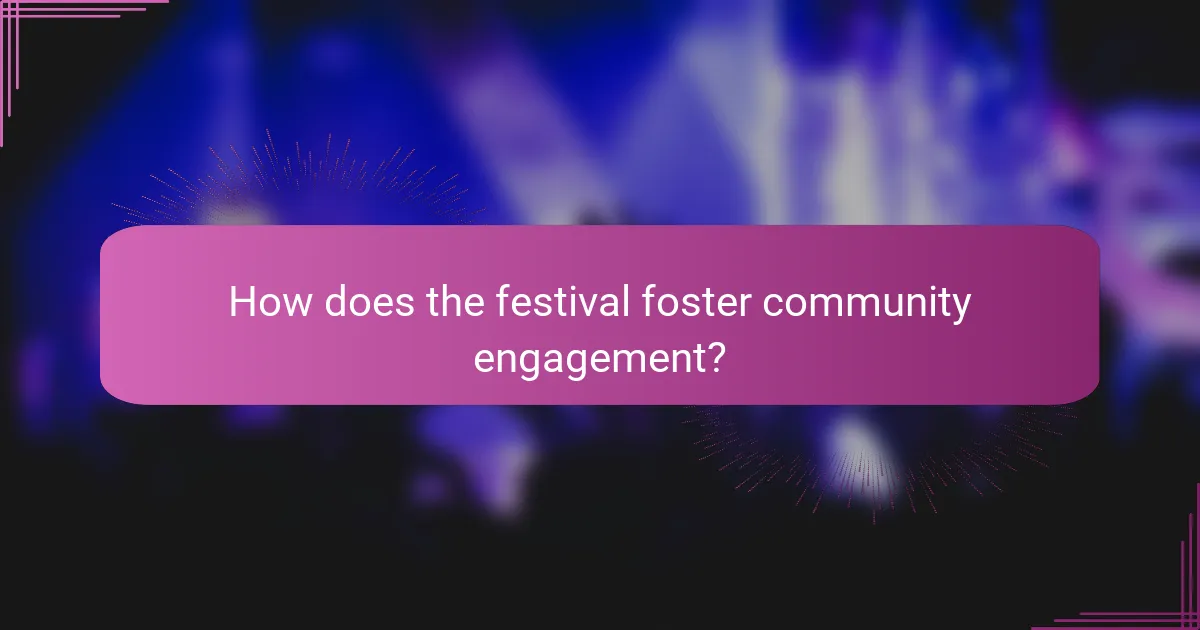
How does the festival foster community engagement?
The festival fosters community engagement by providing interactive activities, cultural exhibitions, and opportunities for collaboration. Participants can join workshops, attend performances, and engage in discussions that celebrate Bulgarian heritage. These experiences encourage social connections and strengthen community bonds. The festival also highlights local artists, promoting their work and fostering a sense of pride among attendees. As a result, the festival becomes a platform for cultural exchange and community development.
What partnerships are formed with local organizations?
The Festival of Bulgarian Culture collaborates with various local organizations to enhance community engagement. Partnerships include cultural institutions, educational entities, and local businesses. These collaborations foster cultural exchange, support local artisans, and promote community participation. For example, schools may host workshops, while local artists showcase their work at festival events.
How do volunteer opportunities enhance community involvement?
Volunteer opportunities significantly enhance community involvement by fostering connections among residents and promoting cultural awareness. The Festival of Bulgarian Culture offers diverse activities and exhibitions, encouraging participation and collaboration. Engaging in these events cultivates a sense of belonging, strengthens community ties, and allows individuals to share their heritage. As a result, volunteers not only contribute to the festival’s success but also develop lasting relationships and a deeper appreciation for their community’s cultural diversity.
Which outreach programs connect the festival with schools?
The festival connects with schools through various outreach programs that promote cultural education. These include workshops, interactive exhibits, and student performances that engage young audiences. Programs like “Cultural Exchange Days” encourage school visits to the festival, fostering community involvement. Additionally, partnerships with local educational institutions enhance curriculum integration, making Bulgarian culture accessible to students.
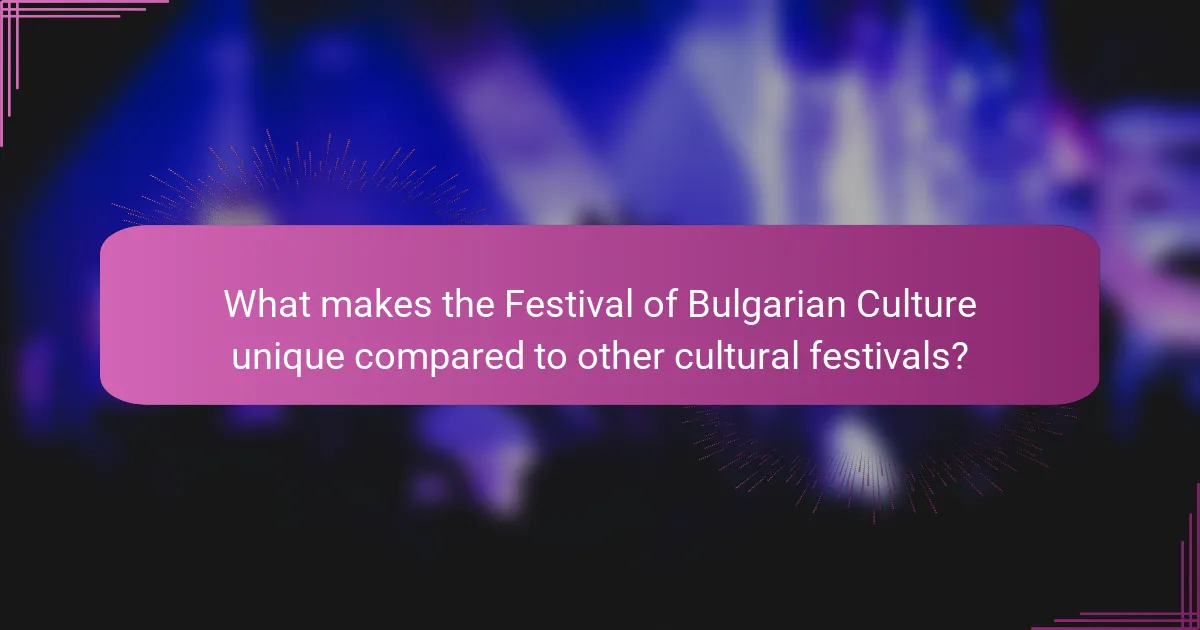
What makes the Festival of Bulgarian Culture unique compared to other cultural festivals?
The Festival of Bulgarian Culture stands out due to its deep-rooted traditions, vibrant community participation, and unique artistic expressions. It features traditional music, dance performances, and culinary showcases that highlight Bulgaria’s rich heritage. Unlike other cultural festivals, it emphasizes local craftsmanship and engages the community through workshops and interactive exhibits. This focus on participation fosters a strong sense of identity and connection among attendees. Additionally, the festival often includes rare cultural artifacts and performances that are not typically found in other festivals, making it a distinctive celebration of Bulgarian culture.
How does the festival incorporate modern interpretations of traditional practices?
The festival incorporates modern interpretations of traditional practices by blending contemporary art forms with cultural heritage. This includes interactive installations that engage audiences and workshops that teach traditional crafts using modern techniques. Additionally, performances often reinterpret folklore through modern dance and music, making the experience relatable to younger generations. The integration of technology, such as virtual reality, enhances storytelling and showcases Bulgaria’s rich cultural history in innovative ways.
What rare cultural elements are featured at the festival?
The festival features rare cultural elements such as traditional crafts, folk music performances, and unique culinary experiences. These aspects highlight the distinct heritage of Bulgarian culture, showcasing lesser-known practices like the art of weaving and regional dance forms. Additionally, artisans demonstrate ancient techniques, providing attendees with an authentic cultural immersion.
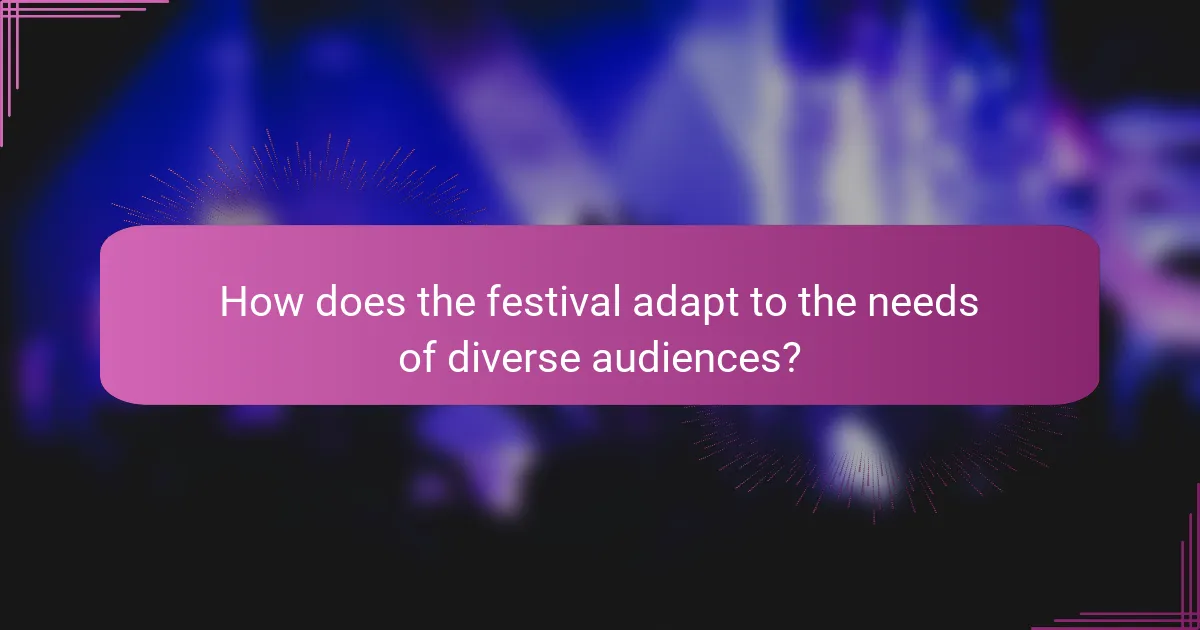
How does the festival adapt to the needs of diverse audiences?
The festival adapts to diverse audiences by offering a variety of activities and events tailored to different interests. These include traditional performances, art exhibitions, and workshops that engage both children and adults. Accessibility features ensure participation from individuals with disabilities, enhancing inclusivity. Additionally, community feedback shapes programming, allowing the festival to evolve and meet audience needs effectively.
What accessibility features are available for attendees?
The Festival of Bulgarian Culture offers various accessibility features for attendees. These include wheelchair access, sign language interpretation, sensory-friendly spaces, and printed materials in large print. Additionally, assistance for individuals with visual impairments is available through guided tours. The festival aims to ensure an inclusive experience for all participants.
How are multilingual resources provided for international visitors?
Multilingual resources for international visitors are provided through translated materials, guided tours in various languages, and bilingual staff. These resources enhance accessibility and engagement with the Festival of Bulgarian Culture. Translations include brochures, signage, and digital content, ensuring all visitors can participate fully. Additionally, community workshops may offer language-specific sessions to foster deeper connections.
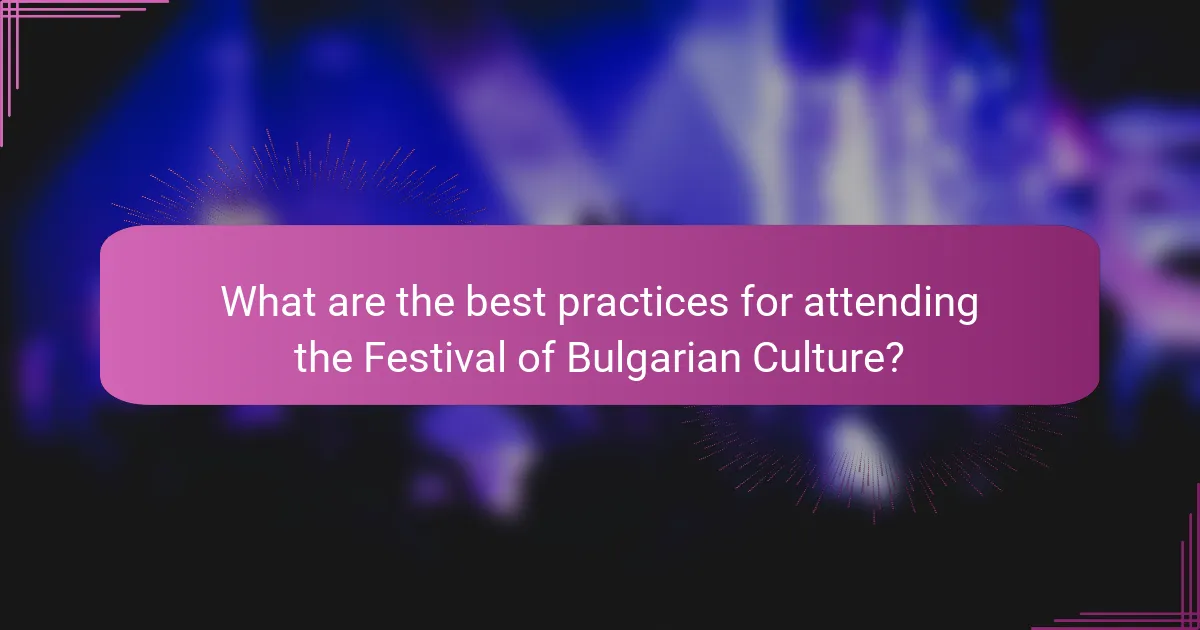
What are the best practices for attending the Festival of Bulgarian Culture?
To attend the Festival of Bulgarian Culture effectively, engage actively, plan your visit, and respect cultural traditions. Participate in workshops and discussions to enhance your understanding of Bulgarian heritage.
Consider these best practices:
1. Research the festival schedule to prioritize key activities.
2. Arrive early to secure a good spot for exhibitions.
3. Interact with local artists and community members to gain insights.
4. Respect local customs and practices to foster a welcoming atmosphere.
How can visitors maximize their experience at the festival?
Visitors can maximize their experience at the Festival of Bulgarian Culture by engaging in scheduled activities, exploring exhibitions, and participating in community events. Attending workshops enhances cultural understanding, while sampling traditional foods offers a taste of Bulgaria. Networking with locals fosters deeper connections. Arriving early provides access to popular sessions and exhibits. Utilizing festival maps and guides ensures visitors don’t miss key attractions.
What common mistakes should attendees avoid during the festival?
Attendees should avoid common mistakes to enhance their experience at the Festival of Bulgarian Culture. First, neglecting to plan their schedule can lead to missing key activities and exhibitions. Second, failing to engage with community members may limit networking opportunities. Third, ignoring dietary options can result in discomfort, especially for those with restrictions. Lastly, not participating in cultural workshops can diminish the immersive experience the festival offers.
